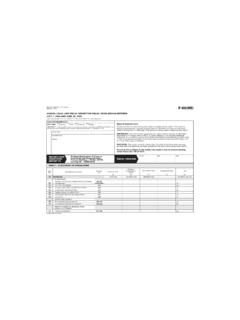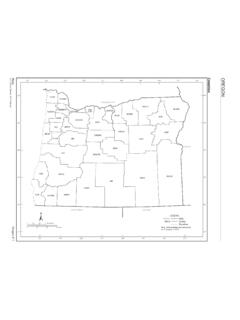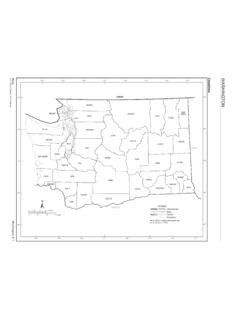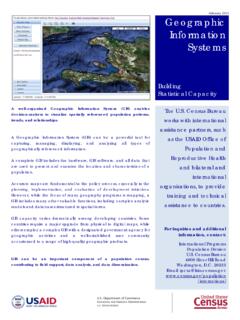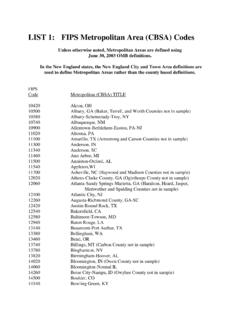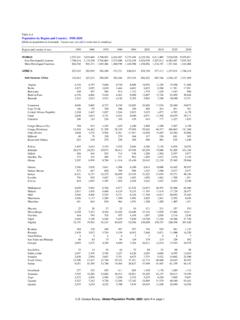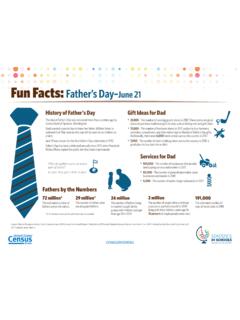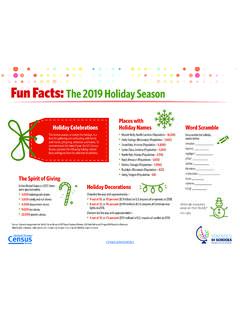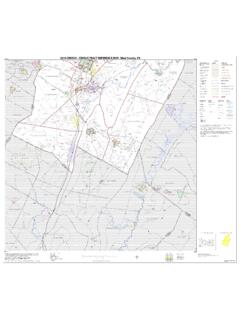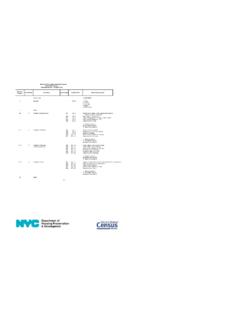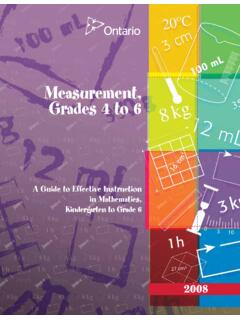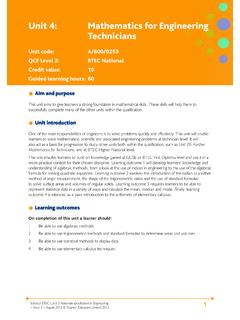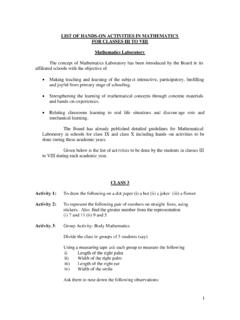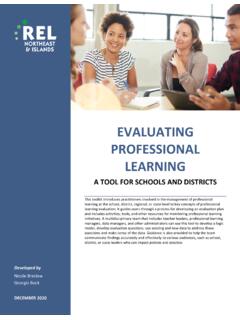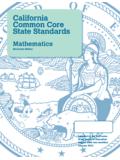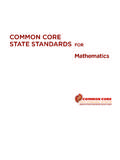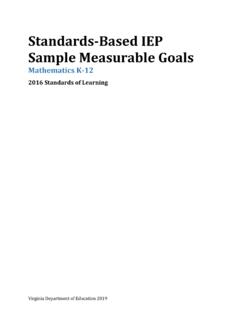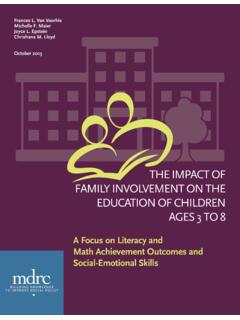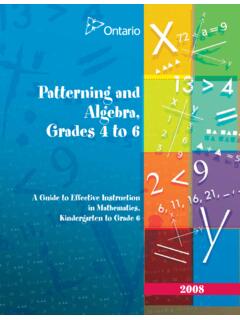Transcription of What Is a Statistical Question? (Teacher Version)
1 WHAT IS A Statistical Question? TEACHER VERSIONS ubject Level:Middle School MathGrade Level:6 Approx. Time Required:6 0 -75 m i n u t e sLearning Objectives: Students will be able to distinguish between Statistical questions and other types of questions. Students will be able to formulate and answer their own Statistical questions, drawing conclusions based on those answers. Students will be able to understand the concept of variability within a data MATH | PAGE 1 WHAT IS A Statistical question ? TEACHER VERSIONA ctivity DescriptionStudents will identify which questions about a data set are Statistical questions and which are not.
2 Then they will generate, answer, and draw conclusions from their own Statistical Grade Level:6 Approximate Time Required:60-75 minutesLearning Objectives: Students will be able to distinguish between Statistical questions and other types of questions. Students will be able to formulate and answer their own Statistical questions, drawing conclusions based on those answers. Students will be able to understand the concept of variability within a data p i c : Statistical questionsSkills Taught: Creating Statistical questions Identifying Statistical MATH | PAGE 2 WHAT IS A Statistical question ?
3 TEACHER VERSIONM aterials Required The student version of this activity , 10 pagesActivity ItemsThe following items are part of this activity . The items, their sources, and any relevant instructions for viewing them online appear at the end of this teacher version. Item 1: Radio Set Ownership Map Item 2: Map of Regions and the Land Areas of the 50 States and District of ColumbiaFor more information to help you introduce your students to the Census Bureau, read Census Bureau 101 for Students. This information sheet can be printed and passed out to your students as AddressedSee charts below.
4 For more information, read Overview of Education Standards and Guidelines Addressed in Statistics in Schools Activities. Common Core State Standards for a Statistical question as one that anticipates variability in the data related to the question and accounts for it in the answers. For example, How old am I? is not a Statistical question , but How old are the students in my school? is a Statistical question because one anticipates variability in students SP Statistics & ProbabilityDevelop understanding of Statistical MATH | PAGE 3 WHAT IS A Statistical question ? TEACHER VERSIONC ommon Core State Standards for Mathematical Make sense of problems and persevere in solving will examine census data to create and answer their own Statistical questions.
5 Construct viable arguments and critique the reasoning of will share their questions, explain why they are good Statistical questions, and critique each other s Council of Teachers of Mathematics Principles and Standards for School MathematicsContent StandardStudents should be able to:Expectation for Grade BandData Analysis and ProbabilityFormulate questions that can be addressed with data and collect, organize, and display relevant data to answer questions, design studies, and collect data about a characteristic shared by two populations or different characteristics within one for Assessment and Instruction in Statistics EducationGAISEL evel ALevel BLevel CFormulate QuestionsXCollect DataAnalyze DataXInterpret MATH | PAGE 4 WHAT IS A Statistical question ?
6 TEACHER VERSIONB loom s TaxonomyStudents will apply what they know about Statistical questions and analyze questions to determine whether they are MATH | PAGE 5 WHAT IS A Statistical question ? TEACHER VERSIONT eacher NotesBefore the ActivityStudents must understand the following key terms: Statistical question a question that can be answered by collecting data and that anticipates variability in those data Statistics the science of collecting, reviewing, and analyzing dataStudents should have a basic understanding of the following concept: Categorical data ( , colors, ice cream flavors) are different from numerical data ( , heights, weights, measures of time).
7 During the ActivityTeachers will ask students what makes a good Statistical question and lead a discussion about their responses. Teachers should help students understand that there are two main features of Statistical questions: that they can be answered by collecting data and that there will be variability in those should closely monitor students as they complete the activity , stopping the class after each part to lead a discussion about the answers. It is especially important that teachers reveal the correct answers to the questions in part 1 so that students can complete parts 2 and 3 should understand that part 4 is optional because it extends well beyond recognizing Statistical questions; however, teachers may find that it is appropriate for advanced students.
8 If teachers do decide to include part 4, which adds 10 15 minutes to the total activity time, they may want to make sure each student has a straight edge to read the data across the ActivityTeachers will have students share their questions from part 3 with the class, encouraging them to explain why they are good Statistical questions and to critique each other s Ideas Teachers could have students choose a topic that interests them, formulate Statistical questions about that topic, and collect and analyze their own data. To adapt this activity to GAISE Level A, teachers could: Create the questions for part 3 that students must determine are or are not Statistical .
9 Create nonstatistical questions that students must turn into Statistical questions for part MATH | PAGE 6 WHAT IS A Statistical question ? TEACHER VERSIONS tudent ActivityClick here to download a printable version for ItemsThe following items are part of this activity and appear at the end of this student version. Item 1: Radio Set Ownership Map Item 2: Map of Regions and the Land Areas of the 50 States and District of ColumbiaStudent learning Objectives I will be able to distinguish between Statistical questions and other types of questions. I will be able to formulate and answer my own Statistical questions, drawing conclusions based on those answers.
10 I will be able to understand the concept of variability within a data Statistical question is a question that can be answered by collecting data that vary. For example, How old am I? is not a Statistical question , but How old are the students in my school? is a Statistical question . This is because to answer the second question , you would need to determine the ages of all students in your school and there would be variability in those data (since not all students are the same age). MATH | PAGE 7 WHAT IS A Statistical question ? TEACHER VERSIONPart 1 Determine If Questions Are StatisticalImagine you want to find out about the height of students in your class using statistics.
